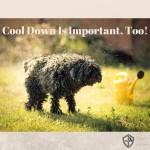Keeping Your Herding Dog Healthy
Just like humans, herding dogs need to maintain a healthy lifestyle. Coincidentally, how you maintain your livestock affects your herding dog’s health. A horse infected with parasites is likely to spread the bloodsuckers to your dog, or a healthy sheep medicated with a certain type of anti-parasitic can land your herding dog in a coma. Don’t be worried; the good news is that such incidents can be avoided if you know the status of both your livestock and your herding dog.

Here are a few guidelines on how to keep your herding dog healthy:
Diet
The size, weight and alertness of adult herding dogs are usually dictated by how they were fed as puppies. Breastfeeding is essential, but puppies should be fed often since they grow faster and their stomachs do not hold food for long. Sometimes, too much milk can cause diarrhea because most puppies cannot digest lactose (milk sugar) after weaning. Unlike adults, puppies should be fed four to six times a day at consistent intervals. Large breed puppies, such as German Shepherds, that will probably weigh over 50 pounds during their adult life, require a special diet rich in protein and calcium. After age six or eight months, feeding time can be reduced to three times a day since most puppies are almost full grown. Eventually, the average herding puppy is considered an adult after 12 months and this can be celebrated by having a taste of adult dog food.
Myth: Feeding a herding dog a meat-only diet is healthy.
Fact: A well-balanced diet for a herding dog includes proteins, vitamins, minerals, fatty acids and carbohydrates, which can be found in meat and veggies. Nevertheless, herding dogs consume a lot of protein in comparison with other pet dogs due to their size and overtime work. Some of the high quality foods that are recommended for herding dogs include fresh tuna, eggs, organic meat, chicken breasts, fermented dairy products, lamb, vegetables and cooked grains. An adult herding dog should be fed two or three times a day. To prevent volvulus syndrome and gastric dilation, the meals should be divided equally and your dog should not engage in intensive exercise immediately after a big meal. Do not forget to provide your dog with a steady supply of clean, fresh water.
Standard formula to calculate calories
30 X Weight of the herding dog in kg + 70 = Daily calorie requirements.
Bear in mind that a majority of herding dogs are above average and the formula depends on the life stage. Puppies do not apply to that rule. Additionally, if your herding dog is overweight, you should decrease the calculated calories by 30 percent. Snacks are counted as part of their daily calories, but you should be careful not to feed your dog treats exceeding 10 percent of the total diet.
Vaccination
Even though vaccinations can save your dog’s life, sometimes it can do more harm than good. Young puppies and senior breed dogs are too compromised to handle a virus vaccination in their body. That is why the minimum vaccination age for most puppies is six weeks, while older dogs are only vaccinated when it is necessary. Of course, you must vaccinate your dog against common diseases especially those enforced by statute, but pumping too many vaccines at once can cause serious side effects. Since it is a sensitive issue, your vet is the only person qualified enough to recommend the vaccination intervals and can ensure your dog’s safety by checking their medical history.
Genetic Testing
Certain breeds of German Shepherds, Collies, English Sheepdogs and Long-haired Whippets have a low tolerance for the anti-parasitic drug Ivermectin. This is because some breeds have the MDR1 gene, which causes the dog to react to common veterinary drugs, especially ivermectin. The allergic reaction is so severe that if a MDR1 gene-mutated dog eats the organic waste of a livestock that was wormed with ivermectin, the dog might succumb to a coma before passing on. However, a thorough genetic test at Washington State University is the only sure way to find out if your breed carries the gene. Know if you should take the appropriate precautions.
Hygiene
Most herding dogs are adapted with a hard, flat coat that is resistant to rain and dust. Grooming can be done by brushing with a bristle brush once or twice a week. The nails should be trimmed once a month and the teeth brushed twice or three times per week. For a majority of herding dogs, an infection in the ears can develop, so you should check them every so often. Bathing should be done at least once every three months, or sooner, if necessary.
Exercise
If your dog is circling and pacing around, then he is probably in need of extra physical activity. However, mental exercise should also be done to optimize their instincts and abilities.
Signs of a Healthy Herding Dog
A fit herding dog walks with zeal and a body language that suggests he is active and alert. There are no bald patches and he will certainly not skip a meal. In contrast, symptoms that portray health deterioration include diarrhea, breathing distress, weight loss, abnormal thirst, slow pace, loss of fur and nasal or eye discharge. If any those symptoms occur, you should consult a veterinarian immediately.
Article By:
Martin Mooray
Image from Free Images






